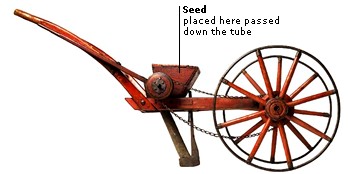- took place in the late 18th and early 19th centuries
- changes in agricultural practices resulted in tremendous increase in productivity
- the agricultural revolution resulted in growth of population and freeing up the labour force
- there were four main changes in agricultural practices: enclosure, mechanization, four field crop rotation, and selective breeding
Enclosure
- prior to the 18th century, farmers used the open-field system.
- farmers subsistence-cropped on strips of land in 3 or four large fields held by the feudal land owner.
- these peasant farmers used common land to graze livestock
- enclosure farming enclosed fields for common use - this made farming more efficient but took the common areas away from the peasants
- When the small scale farmers had to pay for their land to be resurveyed they often couldn't afford the costs and were forced to sell their land, often for much less than it was worth.
Mechanization
- certain inventions made a huge difference to the efficiency of farming - these inventions included Jethro Tull's seed drill, the Rotherham iron plough and the Scot's iron plough, and Andrew Meikle's threshing machine.
Crop Rotation
- initially this was a three field rotation - two fields were planted with different crops (i.e. wheat and barley) and the third was left fallow, or empty, allowing the third field to replace minerals and nutrients that had been taken by the crops previously planted
- later, it was discovered that growing legumes in the fallow field helped to restore nitrogen
- eventually it was discovered that a four field rotation was more efficient than a three field system
- because the fields had better nutrients the crops were better
- this improved the diet of both people and livestock
- more and better livestock were kept which meant better and more manure which helped to grow better crops
Selective Breeding
- by breeding animals that had desirable qualities, quality of livestock began to improve
Effects on History
- this was a major turning point in history
- the increase of the population of Great Britain was able to be sustained due to better farming techniques and increased production of crops
- early in the agricultural revolution a new class of landless labourers developed leading to a growth in the cottage industries
- women had worked side by side with their farmer husbands, however the new iron ploughs were too heavy and women were relegated to other work, often taking part in cottage industries to supplement the farming income
- other women were forced into domestic services or prostitution








No comments:
Post a Comment